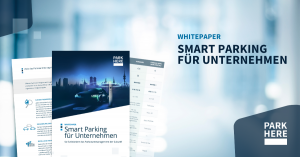Legal Requirements
Do employees have a legal claim to company parking spaces? In short: no. An exception is if the workplace cannot be reached by public transport. In addition, the employer may charge fees for the parking spaces provided; they do not have to be made available free of charge.
There are few legal regulations regarding the distribution of parking spaces:
- The works council has a right to be involved.
- The principle of equal treatment under labor law and the General Equal Treatment Act (AGG) also apply to the allocation of parking spaces. However, it does not constitute a violation if a company’s parking spaces are allocated according to company hierarchy, for example.
Women may be given preference for safety reasons
Women are more frequently victims of violent sexual assault. It is therefore permissible to give them preference when allocating parking spaces, for example, by assigning female employees those parking spaces that are closer to the entrance of the company building or where the path is better lit.
Figure 1: It is permissible to provide women with better-located parking spaces.
This is the legal situation for severely disabled employees
Under certain circumstances, the employer’s duty of care under labor law may include providing suitable parking spaces for severely disabled employees. However, the situation depends on the specific disability of the person concerned. The central question is: Would the employee suffer disadvantages due to his or her specific disability without a parking space suitable for the disabled? In most cases, this is likely to apply to employees with walking disabilities. A wheelchair user, for example, would be entitled to a parking space that is large enough for him or her to get in and out of the vehicle.
This is how Companies Have Managed Their Parking Spaces so Far
Most companies adhere to the “first come, first serve” principle when allocating their parking spaces or allocate the parking spaces according to hierarchy or length of service. However, these parking concepts have some disadvantages:
- First come, first serve: In this case, those employees who arrive at work early are rewarded. Those who come later, for example because they had to take their children to daycare, are at a disadvantage. In addition, a solution must always be found for reservations, for example when an investor or a promising applicant comes to the company
- According to hierarchy or company affiliation: In principle, there is nothing wrong with using the company hierarchy as a distribution criterion for the allocation of parking spaces. However, it is a rather rigid and inflexible system that often leads to half-empty parking garages. This is because when a department head is on vacation, his parking space is usually not released for other employees.
So how can new concepts contribute to optimal utilization of parking spaces by companies?
Smart Parking: New Concepts for the Distribution of Parking Spaces in the Company
In recent years, some new concepts for parking space management have become established on the market. What they all have in common is that they use digital solutions to make the distribution of parking spaces more efficient and thus want to optimize the utilization of parking space.
Vodafone Smart Parking
Auch Vodafone is also active in the field of Smart Parking. The company’s offer is aimed at cities and municipalities as well as all operators of parking areas, including companies with their own company parking spaces. Vodafone Smart Parking offers a complete solution with hardware (sensors & gateways), an IoT platform for administration and the corresponding connectivity.
Wunder Mobility
Wunder Mobility offers a wide range of service solutions for shuttle and vehicle sharing providers. In addition, Wunder Mobility also provides apps for fleet management and carpooling, and thus also offers digital parking management for employers.
ParkHere
ParkHere offers digital parking space optimization for companies. With the help of self-developed intelligent software and hardware, parking space operators can optimally design the utilization of parking spaces thanks to dynamic parking space allocation. Parking space users can conveniently reserve parking spaces via an app, their stored license plate is automatically recognized and the app then navigates them to their parking space.
Figure 2: Digital parking space optimization with ParkHere: With automatic license plate recognition and flexible parking space reservation.
What is Important with the New Digital Concepts?
If you as an entrepreneur want to introduce Smart Parking on your company’s own parking lot or in the employee parking garage, you should make sure to choose a provider that excels in both hardware and software The following aspects should be covered:
- Access management: With the help of license plate recognition, access to parking areas can be regulated automatically – this ensures, among other things, a smooth traffic flow. In addition, it is ideal if payment can also be automated if necessary.
- Administration and analysis: The parking space operator should have the opportunity to analyze and manage the distribution and utilization of parking spaces at a glance.
- App for employees or users: If communication with individual employees is necessary, for example to inform them about the assigned parking space, this should also run as smoothly and easily as possible.
These are the Advantages of Smart Parking
New smart parking management solutions offer companies numerous advantages over the previous allocation keys.
Efficient utilization
Half-empty parking garages, while at the same time employees cannot find a parking space, are a thing of the past with Smart Parking. Instead, the available parking space is used optimally and efficiently, for example by taking vacation times into account and allocating parking spaces differently during this time.
Lean administration
Especially in large companies, managing parking spaces via Excel or similar can involve a lot of effort. Employees who could also be doing other work during this time take care of the distribution of parking spaces. With the new tools, however, administration can also be made leaner and more efficient.
Higher employee satisfaction
Last but not least, employee satisfaction also increases when they find a parking space more often and more easily. In addition, there are fewer delays due to parking space searches. A secure employee parking space is often perceived as a real benefit and can thus contribute to employee retention.
Conclusion: New Paths in Terms of Parking Space Management
So far, company-owned parking spaces in companies are usually distributed according to the “First-Come, First-Serve” principle or according to company hierarchy. However, this often leads to inefficient utilization of parking space. In recent years, some companies have established themselves on the market that offer new digital solutions for parking space management. This allows parking spaces to be used more efficiently, and administration is also made easier.
Although digitization in the area of parking spaces is still in its infancy, it is nevertheless clear that more and more companies are dealing with the topic, which is not least the result of several start-up foundations on the market. It remains to be seen how these first concepts for intelligent parking space solutions will develop in the future.
Further information on the topic of Smart Parking for companies has been summarized for you in this free white paper.
Sources and further links:
https://blog.wiwo.de/management/2014/09/10/parkplatze/
https://www.zeit.de/karriere/beruf/2011-09/arbeitsrecht-pkw-stellplatz
https://www.test.de/Arbeitsrecht-Welche-Regeln-beim-Parken-vor-dem-Buero-gelten-4767472-0/
All sources accessed on December 18, 2019



